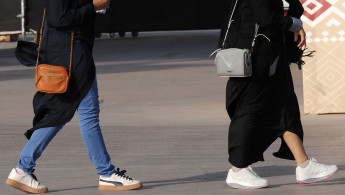Saudi Muslim cleric says abayas should not be mandatory for women
A leading Saudi cleric said Friday that the traditional abaya gown should not be compulsory in the kingdom, so long as women still maintain a modest appearance in public.
Sheikh Abdullah al-Mutlaq, part of Saudi Arabia's inner-circle of clerics, said on a television show that the long black robe traditionally worn by women should not be mandatary.
"More than 90 percent of pious Muslim women in the Muslim world do not wear abayas," Sheikh Mutlaq said on Friday, according to Reuters. "So we should not force people to wear abayas."
He said the gown - popular across the Gulf region - is not only correct Islamic item of clothing and there are offer ways for women to appear modest.
Women elsewhere in the Muslim world often wear other garments that abide to Islamic stipulations on dress.
This tradition has been stretched by some younger Saudi women who often wear abayas with open slits revealing their jeans.
Popular designs with colours and patterns that differ from the plain black cloaks typically adorned by older generations are also commonly worn.
It follows a recent modernisation push in Saudi Arabia under Crown Prince Mohammed bin Salman, who is tried to create an environment more appealing to young Saudis and foreign investors.
Islamic rulings play a key role in the kingdom's rule of law, which not only includes dress codes but also separation of sexes in public places and guardianship rules on women.
Reforms have been introduced with limits to the powers of the religious police and a date for the lifting a ban on women driving in the kingdom.
Women have been allowed to some sporting events and a long-standing ban on cinemas in the kingdom is being lifted.
The reform drive has coincided with Mohammed bin Salman's push to cement his power in the kingdom with a wave of arrests of bloggers, journalists, activists, businessmen and powerful royals.
Despite relaxing social rules Saudi Arabia is still considered one of the least democratically and media free countries in the world.





 Follow the Middle East's top stories in English at The New Arab on Google News
Follow the Middle East's top stories in English at The New Arab on Google News
![The UAE is widely suspected of arming the RSF militia [Getty]](/sites/default/files/styles/image_330x185/public/2024-11/GettyImages-472529908.jpg?h=69f2b9d0&itok=Yauw3YTG)
![Netanyahu furiously denounced the ICC [Getty]](/sites/default/files/styles/image_330x185/public/2024-11/GettyImages-2169352575.jpg?h=199d8c1f&itok=-vRiruf5)
![Both Hamas and the Palestinian Authority welcomed the ICC arrest warrants [Getty]](/sites/default/files/styles/image_330x185/public/2024-11/GettyImages-2178351173.jpg?h=199d8c1f&itok=TV858iVg)